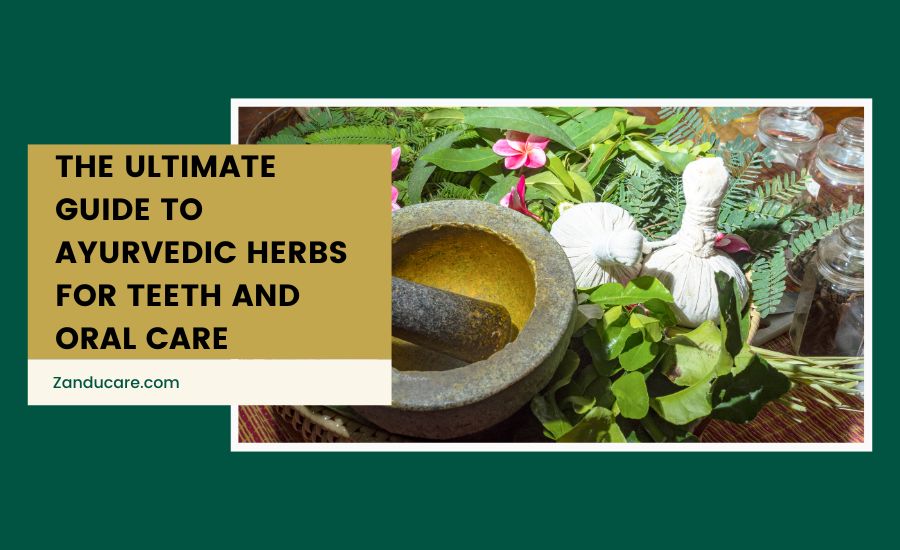
6 Best Ayurvedic Herbs for Teeth and Oral Care & Hygiene
Ayurveda, an ancient Indian medical system, offers a holistic approach to dental health. Ayurvedic remedies are recognised for their natural effectiveness and minimal side effects, promoting strong teeth and healthy gums through herbs and natural practices.
This post will explore various Ayurvedic herbs that enhance oral care. Expect to learn about their benefits, how to use them, and tips for incorporating these practices into your daily routine for optimal dental health. Oral hygiene is crucial for overall health and well-being.
Understanding Ayurveda and oral care
The ancient Indian medical system known as Ayurveda strongly emphasises overall health, including dental health. Regarding oral hygiene, Ayurvedic beliefs emphasise preserving bodily equilibrium through natural therapies and lifestyle choices. In Ayurveda, dental health is referred to as "Danta Swasthya" and entails using certain herbs and methods to maintain healthy teeth and gums.
The goals of Ayurvedic oral hygiene procedures include oil pulling, using herbal pastes, and using mouth rinses to strengthen gums, clean the mouth, and stave against dental problems. Herbs with antibacterial, anti-inflammatory, and therapeutic qualities, such as liquorice, neem, and clove, enhance dental health. Combining these natural methods, Ayurveda seeks to support general well-being and long-term oral health.
|
Did you know
|
List of Key Ayurvedic Herbs for Teeth and Oral Care

Here are some of the best Ayurvedic herbs for healthy teeth and oral care:
1. Neem (Azadirachta indica)
Neem is a common herb used in homoeopathic and Ayurvedic treatments. It is known for its inherent antiseptic, astringent, and antibacterial qualities. You are probably aware that some people use neem twigs for dental treatment. This is so because Neem is an expert in eliminating harmful oral bacteria. Chewing on neem leaves helps stop tooth decay and improves breath.
Neem is an anti-inflammatory herb used to reduce gum irritation. It is also used to prevent periodontitis and gingivitis, two gum diseases. Because of its benefits for oral health, neem is a main ingredient in most types of toothpastes.
2. Clove (Syzygium aromaticum)
Do you recall having a toothache as a child and having cloves to chew on from your parents? Even dentists use cloves on their patients as a post-operative pain relief. Primarily because of its active ingredient, eugenol, it naturally has antibacterial and analgesic properties. It strongly numbs the mouth, lessens pain and inflammation, and even relieves the worst tooth pain!
Clove oil is a natural antibiotic, antifungal, and antiviral that relieves many illnesses, including headaches, indigestion, asthma, stress, and blood impurities. Nonetheless, it is most frequently used in dental care because of its superior antibacterial properties and capacity to numb and reduce pain.
3. Licorice Root (Glycyrrhiza glabra)
Glycyrrhiza glabra, or licorice root, has several advantages for gums and teeth. Thanks to its antibacterial and anti-inflammatory qualities, it fights off the bacteria that cause gum disease and tooth decay. Chewing licorice root or utilising products containing licorice can soothe inflamed gums, avoid cavities, and reduce plaque.
Licorice root has long been utilised in herbal therapy to address problems related to oral health. Chewing it helped to clean teeth and improve breath. Licorice extract is used in mouthwashes and toothpaste to increase the products' ability to keep teeth clean. According to studies, licorice root helps prevent the growth of dangerous bacteria, which makes it a useful supplement to dental hygiene practices.
4. Triphala
Three fruits are combined to make Triphala, a classic Ayurvedic herbal remedy: Amalaki (Indian gooseberry), Haritaki, and Bibhitaki. It is well known for its detoxifying qualities that aid in toxin removal and body cleansing. Frequent usage of Triphala enhances general well-being, aids healthy digestion, and encourages regular bowel movements.
Triphala is frequently used to maintain good oral hygiene. It can be used as a mouthwash to strengthen gums, lessen plaque, and stop cavities. It is a natural medicine that is versatile and effective because of its inherent antibacterial characteristics, which aid in maintaining a clean and healthy mouth.
5. Babool (Acacia Arabica)
Acacia Arabica, or babool, is well-known for its astringent qualities, which have several advantages, particularly in the dental field. Because of its astringent properties, babool promotes general dental health by tightening gums and reducing inflammation. Because of its antibacterial qualities, it fights bacteria and stops tooth decay and foul breath. When using Babool for dental care, you can chew on tiny twigs to naturally clean your teeth and gums.
Another way is to brush with babool bark powder mixed with water, which can be used as a natural toothpaste. This can support the maintenance of healthy gums and the reduction of plaque. Babul is a helpful natural cure for dental hygiene since it can strengthen teeth, promote healthier gums, and improve breath when used regularly in these ways.
6. Turmeric (Curcuma longa)

This common curry ingredient has been used for generations to treat gum and teeth problems in traditional Indian medicine, including Ayurveda. Why? due to its amazing anti-inflammatory qualities! This miracle herb is well-known for treating a wide range of
circumstances, and it has even been demonstrated to cure oral cancer's precancerous stages. Numerous research investigations have assessed the efficacy of turmeric in managing gum disease, mitigating discomfort, and inhibiting the proliferation of detrimental microorganisms. Turmeric has even been shown in one study to affect gingival fluid's levels of inflammatory markers, which considerably lowers gingival inflammation.
Recommended Ayurvedic Practices for Oral Health
Daily routines and practices for maintaining oral hygiene
- Ayurveda emphasises the importance of daily oral hygiene routines to maintain overall health.
- Regular oral care prevents diseases and ensures fresh breath.
Oil pulling with Sesame or Coconut oil:
- Swish a tablespoon of sesame or coconut oil in your mouth for 15-20 minutes.
- This practice helps remove toxins, reduces plaque, and promotes gum health.
- It also helps whiten teeth and freshen breath.
- Spit out the oil and rinse your mouth with warm water.
Tongue scraping
- Use a tongue scraper made of copper or stainless steel.
- Scrape the tongue from back to front gently to remove the white coating.
- This practice eliminates bacteria, improves taste sensation, and prevents bad breath.
- Perform tongue scraping daily in the morning before brushing your teeth.
Herbal tooth powders and pastes
- Use herbal tooth powders and pastes containing ingredients like neem, clove, and turmeric.
- These natural ingredients have antibacterial, anti-inflammatory, and analgesic properties.
- Brush your teeth twice a day with these herbal products to maintain oral hygiene.
- Avoid commercial toothpaste with harmful chemicals; instead, opt for natural alternatives.
By following these Ayurvedic practices, you can maintain excellent oral health, prevent dental issues, and enjoy a clean, fresh mouth.
Benefits of Following Ayurvedic Oral Care Regime
Below are the benefits of Ayurvedic oral care:
Natural ingredients
Ayurvedic oral care products use natural components and are free of synthetic chemicals, such as neem, clove, and licorice. These plants have antibacterial and anti-inflammatory qualities that help maintain mouth hygiene and prevent infections.
Strengthens teeth and gums

Regular use of Ayurvedic oral care products can strengthen teeth and gums. Ingredients like meswak and babul are reported to improve tooth strength and gum health, lowering the chance of tooth decay and gum disease.
Reduces bad breath
Products with an Ayurvedic base like copper tongue cleaners and etc, can effectively treat foul breath. Herbs with cooling qualities, such as cardamom and mint, are frequently utilised. They aid in getting rid of the bacteria that produce bad breath, keeping your mouth clean and fresh all day.
Overall oral health
Overall, Ayurvedic dental care promotes oral health. The holistic approach ensures that plaque, cavities, and gum inflammation are treated. Frequent use promotes a healthy oral environment, which benefits teeth and gum health without the negative effects of chemical-based solutions.
Do check our related post:Conclusion
Ayurvedic herbs are a great way to care for teeth and gums because they are natural, strengthen teeth and gums, lessen bad breath, and improve oral health in general. These herbs ensure a healthy mouth and offer a secure and efficient substitute for goods containing chemicals.
I urge you to incorporate Ayurvedic procedures into your regular dental hygiene regimen. Ayurvedic goods such as mouthwashes and toothpaste made with herbs can greatly enhance oral health.
Ayurvedic oral care is a healthier, more natural way to care for teeth and gums. Following these natural methods can avoid oral problems and have a clean, fresh mouth. Maintaining long-term dental health through Ayurveda is beneficial and achievable.
FAQs
1. What are the best Ayurvedic herbs for oral health?
Turmeric, clove, and neem are among the many Ayurvedic medicines that are great for dental health. Turmeric lowers inflammation, cloves relieve toothaches, and neem has antimicrobial qualities.
2. How often should I use neem for my teeth?
Use neem toothpaste every day for optimal effects. Its antimicrobial qualities keep teeth healthy and help prevent gum disease.
3.Can oil pulling replace brushing?
Oil pulling can complement brushing but not replace it. It helps reduce bacteria in the mouth and improves oral hygiene when done daily.
4. Are there any side effects of using clove for tooth pain?
Using clove oil directly on gums can sometimes irritate them. It's best to dilute it or consult a dentist before use.
5. How do I make a natural mouthwash at home?
Add a few drops of peppermint and tea tree oils to some water. This produces a pleasant mouthwash, eliminates bacteria, and freshens breath.
6. Is it safe to use turmeric on teeth every day?
Yes, using turmeric paste daily can strengthen gums and whiten teeth naturally. It's gentle and effective.
7. Can Ayurvedic practices prevent cavities?
Ayurvedic procedures like oil pulling and herbal toothpaste can help prevent cavities by lowering dangerous microorganisms.
8. What is the best time for oil pulling?
Oil pulling is most effective when done in the morning before eating or drinking. Aim for about 10-15 minutes.
9. How effective is Triphala for gum health?
Because of its well-known anti-inflammatory qualities, Triphala may help promote healthier gums. Applying it as a paste or powder has potential advantages.
10. Should I consult a dentist before trying Ayurvedic oral care methods?
It's advisable to consult a dentist before starting any new oral care routine, including Ayurvedic methods. They can provide guidance based on your dental health needs.
References:
- Neem is a common herb used in homoeopathic and Ayurvedic treatments. It is known for its inherent antiseptic, astringent, and antibacterial qualities. (https://www.researchgate.net/)
- Nonetheless, it is most frequently used in dental care because of its superior antibacterial properties and capacity to numb and reduce pain. (https://www.researchgate.net/)
- Three fruits are combined to make Triphala, a classic Ayurvedic herbal remedy: Amalaki (Indian gooseberry), Haritaki, and Bibhitaki. (https://www.researchgate.net/)
- Swish a tablespoon of sesame or coconut oil in your mouth for 15-20 minutes. (https://www.researchgate.net/)
- Use a tongue scraper made of copper or stainless steel. (https://www.researchgate.net/)





